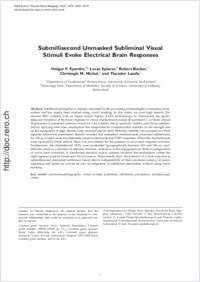Submillisecond unmasked subliminal visual stimuli evoke electrical brain responses
- Sperdin, Holger F. Department of Fundamental Neurosciences, University of Geneva, Switzerland
- Spierer, Lucas Neurology Unit, Department of Medicine, Faculty of Sciences, University of Fribourg, Switzerland
- Becker, Robert Department of Fundamental Neurosciences, University of Geneva, Switzerland
- Michel, Christoph M. Department of Fundamental Neurosciences, University of Geneva, Switzerland
- Landis, Theodor Department of Fundamental Neurosciences, University of Geneva, Switzerland
-
01.04.2015
Published in:
- Human Brain Mapping. - 2015, vol. 36, no. 4, p. 1470–1483
English
Subliminal perception is strongly associated to the processing of meaningful or emotional information and has mostly been studied using visual masking. In this study, we used high density 256-channel EEG coupled with an liquid crystal display (LCD) tachistoscope to characterize the spatio-temporal dynamics of the brain response to visual checkerboard stimuli (Experiment 1) or blank stimuli (Experiment 2) presented without a mask for 1 ms (visible), 500 µs (partially visible), and 250 µs (subliminal) by applying time-wise, assumption-free nonparametric randomization statistics on the strength and on the topography of high-density scalp-recorded electric field. Stimulus visibility was assessed in a third separate behavioral experiment. Results revealed that unmasked checkerboards presented subliminally for 250 µs evoked weak but detectable visual evoked potential (VEP) responses. When the checkerboards were replaced by blank stimuli, there was no evidence for the presence of an evoked response anymore. Furthermore, the checkerboard VEPs were modulated topographically between 243 and 296 ms post-stimulus onset as a function of stimulus duration, indicative of the engagement of distinct configuration of active brain networks. A distributed electrical source analysis localized this modulation within the right superior parietal lobule near the precuneus. These results show the presence of a brain response to submillisecond unmasked subliminal visual stimuli independently of their emotional saliency or meaningfulness and opens an avenue for new investigations of subliminal stimulation without using visual masking.
- Faculty
- Faculté des sciences et de médecine
- Department
- Médecine 3ème année
- Language
-
- English
- Classification
- Biological sciences
- License
- License undefined
- Identifiers
-
- RERO DOC 255904
- DOI 10.1002/hbm.22716
- Persistent URL
- https://folia.unifr.ch/unifr/documents/304204
Statistics
Document views: 75
File downloads:
- spi_sus.pdf: 175
